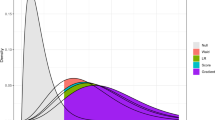Abstract
Consideration will be given to a model developed by Rasch that assumes scores observed on some types of attainment tests can be regarded as realizations of a Poisson process. The parameter of the Poisson distribution is assumed to be a product of two other parameters, one pertaining to the ability of the subject and a second pertaining to the difficulty of the test. Rasch's model is expanded by assuming a prior distribution, with fixed but unknown parameters, for the subject parameters. The test parameters are considered fixed. Secondly, it will be shown how additional between- and within-subjects factors can be incorporated. Methods for testing the fit and estimating the parameters of the model will be discussed, and illustrated by empirical examples.
Similar content being viewed by others
References
Abramowitz, M., & Stegun, I. A. (1964).Handbook of mathematical functions. Washington, DC: National Bureau of Standards.
Andersen, E. B., & Madsen, M. (1977). Estimating the parameters of the latent population distribution.Psychometrika, 42, 357–374.
Baker, R. J., & Nelder, J. A. (1978).The GLIM system, Release 3, generalized linear interactive modelling. Oxford: Numerical Algorithms Group.
Bock, R. D. (1972). Estimating item parameters and latent ability when responses are scored in two or more nominal categories.Psychometrika, 37, 29–51.
Deely, J. J., & Lindley, D. V. (1981). Bayes empirical Bayes.Journal of the American Statistical Association, 76, 833–841.
Engel, J. (1984). Models for response data showing extra-Poisson variation.Statistica Neerlandica, 38, 159–167.
Engel, J. (1987).The analysis of dependent count data. Unpublished doctoral dissertation, Agricultural University, Wageningen.
Fischer, G. H. (in press). On power series models and the specifically objective assessment of change in event frequencies. In J. C. Falmagne & J. P. Doignon (Eds.),Mathematical psychology: Current developments. New York: Springer Verlag.
Haberman, S. J. (1978).Analysis of qualitative data. New York: Academic Press.
Jansen, M. G. H. (1986). A Bayesian version of Rasch's multiplicative Poisson model for the number of errors on an achievement test.Journal of Educational Statistics, 11, 147–160.
Jansen, M. G. H., & Snijders, T. A. B. (1991). Comparison of Bayesian estimation procedures for two-way contingency tables without interaction.Statistica Neerlandica, 45, 51–65.
Leonard, T., & Novick, M. R. (1986). Bayesian full rank marginalization for two-way contingency tables.Journal of Educational Statistics, 11, 33–56.
Lord, F. M., & Novick, M. R. (1986).Statistical theories of mental test scores. Reading, MA: Addison-Wesley.
Maritz, J. S. (1970).Empirical Bayes methods. London: Methuen.
McCullagh, P., & Nelder, J. A. (1989).Generalized linear models. London: Chapman and Hall.
Owen, R. J. (1969).A Bayesian analysis of Rasch's multiplicative Poisson model (Research Bulletin 69-64).Princeton, NJ:Educational Testing Serivice.
Rasch, G. (1973). Two applications of the multiplicative Poisson models in road accidents statistics.Bulletin of the International Statiustical Institute (Proceedings of the 39th session, Vienna), 31–43.
Rasch, G. (1980).Probabilistic models for some intelligence and attainment tests. Chicago: The University of Chicago Press. (original work published in 1960)
Rigdon, S. E., & Tsutakawa, R. K. (1983). Parameter estimation in latent trait models.Psychometrika, 48, 567–574.
Thissen, D. (1982). Marginal maximum likelihood estimation for the one-parameter logistic model.Psychometrika, 47, 175–186.
van Duijn, M. A. J., & Jansen, M. G. H. (1990).Empirical Bayes mixed-model analysis for count data (Internal publication, No. HB-90-1010-EX). Groningen, The Netherlands: University of Groningen.
Author information
Authors and Affiliations
Rights and permissions
About this article
Cite this article
Jansen, M.G.H., van Duijn, M.A.J. Extensions of Rasch's multiplicative poisson model. Psychometrika 57, 405–414 (1992). https://doi.org/10.1007/BF02295428
Received:
Revised:
Issue Date:
DOI: https://doi.org/10.1007/BF02295428




